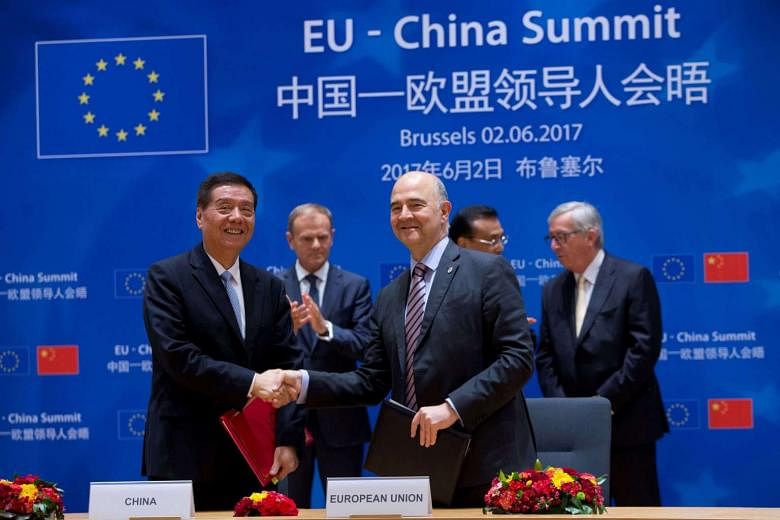BRUSSELS (REUTERS) - China and the European Union pledged unity in fighting global warming on Friday (June 2), a day after President Donald Trump announced a US withdrawal from the Paris climate pact, but they showed lingering divisions on international trade.
Chinese Premier Li Keqiang and top EU officials agreed a joint statement, backed by all 28 EU states, committing the European Union and China to full implementation of the 2015 Paris Climate Agreement.
The joint statement, the first between the China and the EU, commits them to cutting back on fossil fuels, developing more green technology and helping raise US$100 billion (S$138 billion) a year by 2020 to help poorer countries cut their emissions.
That figure was agreed before the US withdrawal announcement. It was not immediately clear if China and the European Union would step in to fill any shortfall.
China has emerged as Europe's unlikely partner in areas from free trade to security, and the talks in Brussels were also due to address North Korea's missile tests and global steel overcapacity.
Trump's announcement on Thursday that he would take the United States out of the Paris accord, saying it would undermine the US economy and cost jobs, drew anger and condemnation from world leaders and heads of industry.
European Climate Commissioner Miguel Arias Canete told reporters in Brussels he deeply regretted the US pullout from the pact to fight the dangers of global warming, which was signed by more than 190 countries, and said it could not be renegotiated as Trump has suggested.
"The agreement is fit for purpose. The Paris agreement is here to stay and the 29 articles of the Paris agreement are not to be renegotiated," he said after meeting his Chinese counterpart Before the formal EU-China summit got underway, Commission President Jean-Claude Juncker told a business conference on Friday that China and the EU recognised the need for international solutions and this was nowhere more important than full implementation of the Paris agreement.
"There is no reverse gear to energy transition. There is no backsliding on the Paris Agreement," Juncker told the conference before the meeting with Li and European Council chief Donald Tusk.
DIVISIONS OVER INVESTMENT
While China needs EU technical know-how to reduce the pollution blighting its cities, the EU is looking to Beijing to take action against emissions blamed for increased droughts, rising seas and other affects of climate change.
China overtook the United States as the world's biggest emitter of greenhouse gases in 2007.
A broader final communique will be issued focusing on a range of other issues expected to be raised at the talks, including a commitment to free trade and measures needed to reduce a global steel glut. On these topics, however, China and the EU seemed less united.
Juncker referred to a World Bank report placing China 78th of 190 countries in terms of the ease of doing business.
"A big economic powerhouse needs to be higher than mid-table," he said, adding that a planned EU-Chinese investment treaty needed to be completed to ensure reciprocal relations.
France, Germany and Italy have mooted the idea of allowing the EU to block Chinese investment in Europe, partly because European companies are denied similar access in China and because of risks of China acquiring prized European technology.
Juncker also referring to "worrying overcapacity" in certain sectors, notably Chinese steel, and urged Beijing to allow European companies access to contracts for China's multi-billion dollar Belt and Road infrastructure investment initiative.
In reply, Li said China was working hard to promote a trade balance with Chinese tourism to Europe now far greater than EU tourism in China. Foreign investment opportunities, he said, were far different from when China first opened up.
"I do hope you can put things into context. We find the problems, but we are working on them ... Our ranking is getting better," he said.

